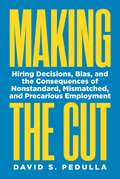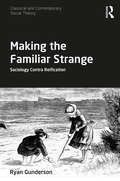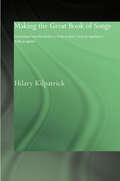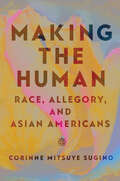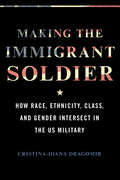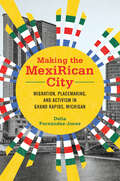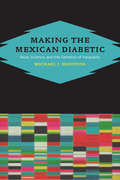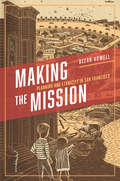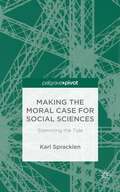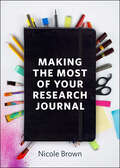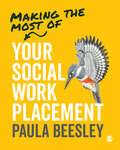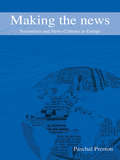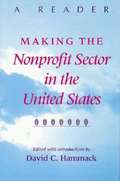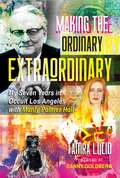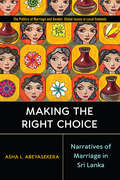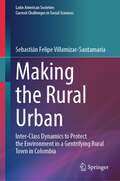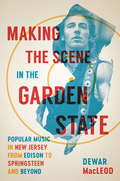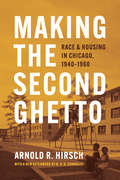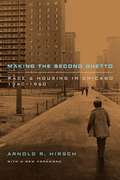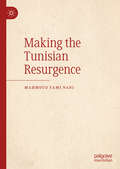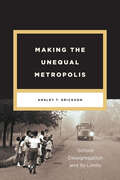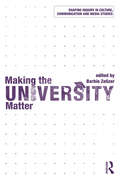- Table View
- List View
Making the Cut: Hiring Decisions, Bias, and the Consequences of Nonstandard, Mismatched, and Precarious Employment
by David PedullaAn in-depth look at how employers today perceive and evaluate job applicants with nonstandard or precarious employment historiesMillions of workers today labor in nontraditional situations involving part-time work, temporary agency employment, and skills underutilization or face the precariousness of long-term unemployment. To date, research has largely focused on how these experiences shape workers’ well-being, rather than how hiring agents perceive and treat job applicants who have moved through these positions. Shifting the focus from workers to hiring agents, Making the Cut explores how key gatekeepers—HR managers, recruiters, and talent acquisition specialists—evaluate workers with nonstandard, mismatched, or precarious employment experience. Factoring in the social groups to which workers belong—such as their race and gender—David Pedulla shows how workers get jobs, how the hiring process unfolds, who makes the cut, and who does not.Drawing on a field experiment examining hiring decisions in four occupational groups and in-depth interviews with hiring agents in the United States, Pedulla documents and unpacks three important discoveries. Hiring professionals extract distinct meanings from different types of employment experiences; the effects of nonstandard, mismatched, and precarious employment histories for workers’ job outcomes are not all the same; and the race and gender of workers intersect with their employment histories to shape which workers get called back for jobs. Indeed, hiring professionals use group-based stereotypes to weave divergent narratives or “stratified stories” about workers with similar employment experiences. The result is a complex set of inequalities in the labor market.Looking at bias and discrimination, social exclusion in the workplace, and the changing nature of work, Making the Cut probes the hiring process and offers a clearer picture of the underpinnings of getting a job in the new economy.
Making the Familiar Strange: Sociology Contra Reification (Classical and Contemporary Social Theory)
by Ryan GundersonThis book examines the meaning and implications of the sociological maxim, ‘make the familiar strange’. Addressing the methodological questions of why and how sociologists should make the familiar strange, what it means to ‘make the familiar strange’, and how this approach benefits sociological research and theory, it draws on four central concepts: reification, familiarity, strangeness, and defamiliarization. Through a typology of the notoriously ambiguous concept of reification, the author argues that the primary barrier to sociological knowledge is our experience of the social world as fixed and unchangeable. Thus emerges the importance of constituting the familiar as the strange through a process of social defamiliarization as well as making this process more methodical by reflecting on heuristics and patterns of thinking that render society strange. The first concerted effort to examine an important feature of the sociological imagination, this volume will appeal to sociologists of any specialty and theoretical persuasion.
Making the Great Book of Songs: Compilation and the Author's Craft in Abû I-Faraj al-Isbahânî's Kitâb al-aghânî (Routledge Studies in Middle Eastern Literatures)
by Hilary KilpatrickThis is the first systematic literary study of one of the masterpieces of classical Arabic literature, the fourth/tenth century Kitâb al-aghânî (The Book of Songs) by Abû I-Faraj al-Isbahânî. Until now the twenty-four volume Book of Songs has been regarded as a rather chaotic but priceless mine of information about classical Arabic music, literature and culture. This book approaches it as a work of literature in its own right, with its own internal logic and coherence. The study also consistently integrates the musical component into the analysis and proposes a reading of the work in which individual anecdotes and poems are related to the wider context, enhancing their meaning.
Making the Human: Race, Allegory, and Asian Americans (Asian American Studies Today)
by Corinne Mitsuye SuginoFrom the debate over affirmative action to the increasingly visible racism amidst the COVID-19 pandemic, Asian Americans have emerged as key figures in a number of contemporary social controversies. In Making the Human: Race, Allegory, and Asian Americans, Corinne Mitsuye Sugino offers the lens of racial allegory to consider how media, institutional, and cultural narratives mobilize difference to normalize a white, Western conception of the human. Rather than focusing on a singular arena of society, Sugino considers contemporary sources across media, law, and popular culture to understand how they interact as dynamic sites of meaning-making. Drawing on scholarship in Asian American studies, Black studies, cultural studies, communication, and gender and sexuality studies, Sugino argues that Asian American racialization and gendering plays a key role in shoring up abstract concepts such as “meritocracy,” “family,” “justice,” “diversity,” and “nation” in ways that naturalize hierarchy. In doing so, Making the Human grapples with anti-Asian racism’s entanglements with colonialism, antiblackness, capitalism, and gendered violence.
Making the Immigrant Soldier: How Race, Ethnicity, Class, and Gender Intersect in the US Military
by Cristina-Ioana DragomirImmigrants to the United States have long used the armed forces as a shortcut to citizenship. Cristina-Ioana Dragomir profiles Lily, Alexa, and Vikrant, three immigrants of varying nationalities and backgrounds who chose military service as their way of becoming American citizens. Privileging the trio’s own words and experiences, Dragomir crafts a human-focused narrative that moves from their lives in their home countries and decisions to join the military to their fraught naturalization processes within the service. Dragomir illuminates how race, ethnicity, class, and gender impacted their transformation from immigrant to soldier, veteran, and American. She explores how these factors both eased their journeys and created obstacles that complicated their access to healthcare, education, economic resources, and other forms of social justice. A compelling union of analysis and rich storytelling, Making the Immigrant Soldier traces the complexities of serving in the military in order to pursue the American dream.
Making the Invisible Visible
by Tojo Thatchenkery Keimei SugiyamaWhen we think of the most visible person in the workplace, we typically think of those who are in the most senior leadership positions; the CEO, the president of the organization. We assume that having visibility means leadership through "showing" others what it means to be a leader. Yet Tojo Thatchenkery and Keimei Sugiyama found different and more collectively focused themes for leadership. "Making the Invisible Visible" isa study of Asians and Asian Americans in the workplace and provides a framework through which to transform the same qualities that are contributing to this invisibility phenomenon into a positive leadership approach that provides a counterweight to balance the showmanship approach to leadership. Showmanship can lead to short term achievement; however, an environment full of only this kind of leadership does not provide the opportunity for long term sustainable performance. They also discuss strategies for Asians and Asian Americans for career management. The invisible leaders that are going unseen today can be the visible leaders of tomorrow. "
Making the MexiRican City: Migration, Placemaking, and Activism in Grand Rapids, Michigan (Latinos in Chicago and Midwest)
by Delia Fernández-JonesLarge numbers of Latino migrants began to arrive in Grand Rapids, Michigan, in the 1950s. They joined a small but established Spanish-speaking community of people from Texas, Mexico, and Puerto Rico. Delia Fernández-Jones merges storytelling with historical analysis to recapture the placemaking practices that these Mexicans, Tejanos, and Puerto Ricans used to create a new home for themselves. Faced with entrenched white racism and hostility, Latinos of different backgrounds formed powerful relationships to better secure material needs like houses and jobs and to recreate community cultural practices. Their pan-Latino solidarity crossed ethnic and racial boundaries and shaped activist efforts that emphasized working within the system to advocate for social change. In time, this interethnic Latino alliance exploited cracks in both overt and structural racism and attracted white and Black partners to fight for equality in social welfare programs, policing, and education. Groundbreaking and revelatory, Making the MexiRican City details how disparate Latino communities came together to respond to social, racial, and economic challenges.
Making the Mexican Diabetic: Race, Science, and the Genetics of Inequality
by Michael MontoyaThis innovative ethnographic study animates the racial politics that underlie genomic research into type 2 diabetes, one of the most widespread chronic diseases and one that affects ethnic groups disproportionately. Michael J. Montoya follows blood donations from "Mexican-American" donors to laboratories that are searching out genetic contributions to diabetes. His analysis lays bare the politics and ethics of the research process, addressing the implicit contradiction of undertaking genetic research that reinscribes race's importance even as it is being demonstrated to have little scientific validity. In placing DNA sampling, processing, data set sharing, and carefully crafted science into a broader social context, Making the Mexican Diabetic underscores the implications of geneticizing disease while illuminating the significance of type 2 diabetes research in American life.
Making the Mission: Planning and Ethnicity in San Francisco
by Ocean HowellIn the aftermath of the 1906 San Francisco earthquake, residents of the city's iconic Mission District bucked the city-wide development plan, defiantly announcing that in their neighborhood, they would be calling the shots. Ever since, the Mission has become known as a city within a city, and a place where residents have, over the last century, organized and reorganized themselves to make the neighborhood in their own image. In Making the Mission, Ocean Howell tells the story of how residents of the Mission District organized to claim the right to plan their own neighborhood and how they mobilized a politics of place and ethnicity to create a strong, often racialized identity--a pattern that would repeat itself again and again throughout the twentieth century. Surveying the perspectives of formal and informal groups, city officials and district residents, local and federal agencies, Howell articulates how these actors worked with and against one another to establish the very ideas of the public and the public interest, as well as to negotiate and renegotiate what the neighborhood wanted. In the process, he shows that national narratives about how cities grow and change are fundamentally insufficient; everything is always shaped by local actors and concerns.
Making the Moral Case for Social Sciences: Stemming the Tide
by Karl SpracklenThe social sciences have a legitimacy problem in the modern world. The natural sciences are viewed as 'proper science' by journalists and policy-makers because they discover 'truths', make money, and help governments solve problems. In turn, defenders of the social sciences borrow the language of instrumentality, profit and policy impact. Karl Spracklen, by contrast, makes the moral case for the social sciences, arguing that they are a necessary social good capable of fighting inequality and revealing the workings of hegemonic power.
Making the Most of Your Research Journal
by Nicole BrownProviding practical guidance based on real-life examples, this book shows researchers different forms and ways of keeping a research journal and how to get the most out of journaling. Appealing to postgraduate students, new and experienced researchers, the book: • provides a theoretical grounding and information about knowledge and sensory systems and reflexivity; • presents a practical exploration of what a journal looks like and when and how to record entries; • includes helpful end-of-chapter exercises and online resources. Providing valuable food for thought and examples to experiment with, the book highlights the different forms of research journals and entries so that readers can find what works for them. Giving researchers licence to do things differently, the book encourages and enables readers to develop their own sense of researcher identity and voice.
Making the Most of Your Social Work Placement
by Paula Beesley'How can I succeed in my placement?' Your placement is a crucial part of your social work training - not only will a successful placement set you up to succeed in the rest of your degree, but it is also your chance to experience what real social work practice is like. This practical guide will takes you step by step through your social work placement, guiding you through what you will be expected to do, and helping you to make the most of your placement. You will learn how to apply the theory and skills you've learnt in practice, to your own observations as well as to your placement portfolio, and how to gain the feedback you need. The books is packed full of hands-on advice, alongside a variety of learning features: student voices talking about their own placement experiences, chapter checklists, reflective tasks, and potential placement pitfalls and opportunities which demonstrate different ways to approach situations you may encounter on placement.
Making the Most of Your Social Work Placement
by Paula BeesleyThis practical guide will takes you step by step through your social work placement, guiding you through what you will be expected to do, and helping you to make the most of your placement. You will learn how to apply the theory and skills you′ve learnt in practice, to your own observations as well as to your placement portfolio, and how to gain the feedback you need. The books is packed full of hands-on advice, alongside a variety of learning features: student voices talking about their own placement experiences, chapter checklists, reflective tasks, and potential placement pitfalls and opportunities which demonstrate different ways to approach situations you may encounter on placement.
Making the News: Journalism and News Cultures in Europe
by Paschal PrestonMaking the News provides a cross-national perspective on key features of journalism and news-making cultures and the changing media landscape in contemporary Europe. . Focusing on the key trends, practices and issues in contemporary journalism and news cultures, Paschal Preston maps the major contours of change as well as the broader industrial, organizational, institutional and cultural factors shaping journalism practices over the past two decades. Moving beyond the tendency to focus on journalism trends and newsmaking practices within a single country, Making the News draws on unique, cross-national research examining current journalism practices and related newsmaking cultures in eleven West, Central and East European countries, including in-depth interviews with almost 100 senior journalists and subsequent workshop discussions with other interest groups Making the News links reviews and discussions of the existing literature to original research engaging with the views and experiences of journalists working at the ‘coal face’ of contemporary newsmaking practices, to provide an original study and useful student text.
Making the Nonprofit Sector in the United States: A Reader
by David C. Hammack"It is a delight to seen an anthology on nonprofit history done so well."—Barry Karl, John F. Kennedy School of Government, Harvard University"This is a volume that everyone concerned about nonprofits—scholar, practitioner, and citizen—will find useful and illuminating."—Peter Dobkin Hall, Program on Non-Profit OrganizationsYale Divinity School"A remarkable book."—Robert Putnam, John F. Kennedy School of Government, Harvard University[One to come from John Simon, School of Law, Yale University by Jan. 13th and others are being solicited.] Unique among nations, America conducts almost all of its formally organized religious activity, and many cultural, arts, human service, educational, and research activities through private nonprofit organizations. Though partially funded by government, as well as by fees and donations, American nonprofits have pursued their missions with considerable independence. Many have amassed remarkable resources and acquired some of the most impressive hospital, university, performing arts, and museum facilities in the world. While some have amassed large endowments, many that surpass one billion dollars, there are also hundreds of thousands of small nonprofits, most with no tangible resources at all. How did the United States come to rely so heavily on nonprofits? Why has it continued to do so? What purposes do Americans seek to advance through nonprofits? How have Americans sought to control them? How have nonprofits been effected by the growth of government in the twentieth century? These questions suggest the complexity of the history of nonprofits in the United States. To help explore that history, this reader presents some of the classic documents in the development of the nonprofit sector along with important interpretations by recent scholars. The selections can be considered a representative part of a single extended conversation by the men and women who have taken part in the effort to define America and the American dream, even as they shaped what we now call the nonprofit sector. The statements by participants in the growth and development of the nonprofit sector are accompanied by essays written by historians and social scientists that provide concise surveys of important issues and periods. The essays give voice to those whose contributions to the American debate about voluntary associations and private institutions would otherwise be difficult to find or comprehend.The selections can be considered a representative part of a single extended conversation by the men and women who have taken part in the effort to define America and the American dream, even as they shaped what we now call the nonprofit sector. The statements by participants in the growth and development of the nonprofit sector are accompanied by essays written by historians and social scientists that provide concise surveys of important issues and periods. The essays give voice to those whose contributions to the American debate about voluntary associations and private institutions would otherwise be difficult to find or comprehend. Each selection has been chosen to define or illuminate important questions in the development of the nonprofit sector in the United States. Many include criticisms of particular nonprofit efforts, or of nonprofit activity in general. The intention is to provoke thought, not to establish an official list of readings. Though not every point of view could be included, the reader does reflect a general understanding of the nature of the nonprofit sector and its significance in the development of the United States. Philanthropic Studies—Dwight F. Burlingame and David C. Hammack, general editors
Making the Ordinary Extraordinary: My Seven Years in Occult Los Angeles with Manly Palmer Hall
by Tamra Lucid• Details how the author and her boyfriend developed a close friendship with Manly Hall and how Hall at first mistook her boyfriend as his heir apparent • Explains how Hall adopted the author as his &“girl Friday&” and personal weirdo screener, giving her access to the inner circles of occult Los Angeles • Richly depicts the characters who worked and gathered at Hall&’s Philosophical Research Society, including Hall&’s wife, the famed &“Mad Marie&” In the early 1980s, underground musicians Tamra Lucid and her boyfriend Ronnie Pontiac discovered the book The Secret Teachings of All Ages at the Bodhi Tree bookstore in Los Angeles. Poring over the tome, they were awakened to the esoteric and occult teachings of the world. Tamra and Ronnie were delighted to discover that the book&’s author, Manly Palmer Hall (1901-1990), master teacher of Hermetic mysteries and collector of all things mystical, lived in LA and gave lectures every Sunday at his mystery school, the Philosophical Research Society (PRS). After their first tantalizing Sunday lecture, Tamra and Ronnie soon started volunteering at the PRS, beginning a seven-year friendship with Manly P. Hall, who eventually officiated their wedding in his backyard. In this touching, hilarious, and ultimately tragic autobiographical account, Tamra shares an intimate portrait of Hall and the occult world of New Age Los Angeles, including encounters with astrologers, scholars, artists, spiritual seekers, and celebrities such as Jean Houston and Marianne Williamson. Tamra vividly describes how she used her time at the PRS to learn everything she could not only about metaphysics but also about the people who practice it. But when Tamra begs Hall to banish a certain man from the PRS--the same man who inherited Hall&’s estate and whom his wife Marie later alleged was Hall&’s murderer--Tamra and Ronnie are the ones banished. Tamra&’s noir chronicle of an improbable friendship between a twenty-something punk and an eighty-year-old metaphysical scholar reveals Hall not only as an inspiring esoteric thinker but also as a genuinely kind human being who simply wanted to share his quest for inner meaning and rare wisdom with the world.
Making the Right Choice: Narratives of Marriage in Sri Lanka (Politics of Marriage and Gender: Global Issues in Local Contexts)
by Asha L. AbeyasekeraMaking the Right Choice unravels the entangled relationship between marriage, morality, and the desire for modernity as it plays out in the context of middle-class status concerns and aspirations for upward social mobility within the Sinhala-Buddhist community in urban Sri Lanka. By focusing on individual life-histories spanning three generations, the book illuminates how narratives about a gendered self and narratives about modernity are mutually constituted and intrinsically tied to notions of agency. The book uncovers how "becoming modern" in urban Sri Lanka, rather than causing inter-generational conflict, is a collective aspiration realized through the efforts of bringing up educated and independent women capable of making "right" choices. The consequence of this collective investment is a feminist conundrum: agency does not denote the right to choose, but the duty to make the "right" choice; hence agency is experienced not as a sense of "freedom," but rather as a burden of responsibility.
Making the Rural Urban: Inter-Class Dynamics to Protect the Environment in a Gentrifying Rural Town in Colombia (Latin American Societies)
by Sebastián Felipe Villamizar-SantamaríaThis book takes the small rural town of La Calera, in the outskirts of the Colombian capital of Bogotá, as a case study to analyze how residents from different social classes – wealthier ex-urban newcomers arriving to traditionally peasant and rural areas – interact to decide how nature will be used in the face of further urban expansion. Contrary to the conflicts in other gentrification cases, including those of “green” gentrification, this book shows how newcomers and longtimers in La Calera use environmental concerns to bridge social class rifts and push the state to provide water, public space, and decision-making power. Residents see abundant ecological resources like water and land around them, but they do not have access to aqueducts, green public space or power over planning decisions affecting the distribution of these resources. As a response, and to challenge the state more effectively, newcomers and longtimers create inter-class alliances through what the author calls third nature: the way residents try to both protect and keep using existing ecological goods. To do so, despite high levels of class inequality, residents had a similar goal of protecting ecological resources around them by intervening in the physical and political landscapes against a state that induces scarcity, selectively enforcing environmental policies to the detriment of Calerunos. As cities all around the Global South continue to grow, urban expansion posits a threat to the environment by transforming agricultural and protected areas into denser residential or touristic spaces. Moreover, as natural resources become scarcer in the face of climate change, inequality might further existing environmental privileges and vulnerabilities. By examining closely how Calerunos bridge class inequalities for environmental reasons, this case highlights processes that inform other gentrifying rural spaces around the world.
Making the Scene
by Stuart HendersonMaking the Scene is a history of 1960s Yorkville, Toronto's countercultural mecca. It narrates the hip Village's development from its early coffee house days, when folksingers such as Neil Young and Joni Mitchell flocked to the scene, to its tumultuous, drug-fuelled final months. A flashpoint for hip youth, politicians, parents, and journalists alike, Yorkville was also a battleground over identity, territory, and power. Stuart Henderson explores how this neighbourhood came to be regarded as an alternative space both as a geographic area and as a symbol of hip Toronto in the cultural imagination.Through recently unearthed documents and underground press coverage, Henderson pays special attention to voices that typically aren't heard in the story of Yorkville - including those of women, working class youth, business owners, and municipal authorities. Through a local history, Making the Scene offers new, exciting ways to think about the phenomenon of counterculture and urban manifestations of a hip identity as they have emerged in cities across North America and beyond.
Making the Scene in the Garden State: Popular Music in New Jersey from Edison to Springsteen and Beyond
by Dewar MacLeodMaking the Scene in the Garden State explores New Jersey’s rich musical heritage through stories about the musicians, listeners and fans who came together to create sounds from across the American popular music spectrum. The book includes chapters on the beginnings of musical recording in Thomas Edison’s factories in West Orange; early recording and the invention of the Victrola at Victor Records’ Camden complex; Rudy Van Gelder’s recording studios (for Blue Note, Prestige, and other jazz labels) in Hackensack and Englewood Cliffs; Zacherley and the afterschool dance television show Disc-o-Teen, broadcast from Newark in the 1960s; Bruce Springsteen’s early years on the Jersey Shore at the Upstage Club in Asbury Park; and, the 1980s indie rock scene centered at Maxwell’s in Hoboken. Concluding with a foray into the thriving local music scenes of today, the book examines the sounds, sights and textures of the locales where New Jerseyans have gathered to rock, bop, and boogie.
Making the Second Ghetto: Race & Housing in Chicago, 1940–1960 (Historical Studies of Urban America)
by Arnold R. HirschFirst published in 1983 and praised by the likes of Ta-Nehisi Coates and Thomas Sugrue, Arnold R. Hirsch’s Making the Second Ghetto is the rare book that has only become more piercingly prescient over the years. Hirsch’s classic and groundbreaking work of urban history is a revelatory look at Chicago in the decades after the Great Depression, a period when the city dealt with its rapidly growing Black population not by working to abolish its stark segregation but by expanding and solidifying it. Even as the civil rights movement rose to prominence, Chicago exploited a variety of methods of segregation—including riots, redevelopment, and a host of new legal frameworks—that provided a national playbook for the emergence of a new kind of entrenched inequality. Hirsch’s chronicle of the strategies employed by ethnic, political, and business interests in reaction to the Great Migration of Southern Blacks in the mid-twentieth century makes startingly clear how the violent reactions of an emergent white population found common ground with policy makers to segregate first a city and then the nation. This enlarged edition of Making the Second Ghetto features a visionary afterword by historian N. D. B. Connolly, explaining why Hirsch’s book still crackles with “blistering relevance” for contemporary readers.
Making the Second Ghetto: Race and Housing in Chicago, 1940-1960
by Arnold R. HirschIn Making the Second Ghetto, Arnold Hirsch argues that in the post-depression years Chicago was a "pioneer in developing concepts and devices" for housing segregation. Hirsch shows that the legal framework for the national urban renewal effort was forged in the heat generated by the racial struggles waged on Chicago's South Side. His chronicle of the strategies used by ethnic, political, and business interests in reaction to the great migration of southern blacks in the 1940s describes how the violent reaction of an emergent "white" population combined with public policy to segregate the city. "In this excellent, intricate, and meticulously researched study, Hirsch exposes the social engineering of the post-war ghetto. "—Roma Barnes, Journal of American Studies "According to Arnold Hirsch, Chicago's postwar housing projects were a colossal exercise in moral deception. . . . [An] excellent study of public policy gone astray. "—Ron Grossman, Chicago Tribune "An informative and provocative account of critical aspects of the process in [Chicago]. . . . A good and useful book. "—Zane Miller, Reviews in American History "A valuable and important book. "—Allan Spear, Journal of American History
Making the Tunisian Resurgence
by Mahmoud Sami NabiThis book investigates the socioeconomic factors that triggered Tunisia’s "revolution for dignity” and the current issues and challenges facing its economy while suggesting mechanisms and instruments for their resolution. The author begins by analyzing the roots of the revolution and the post-revolution situation from a political sociology perspective and then diagnoses the Tunisian economy before and after the revolution and identifies the multidimensional binding constraints preventing it from escaping the middle-income trap. The book then explores the pillars of an inclusive development strategy that Tunisia should pursue. The emphasis is made on building inclusive institutions, developing a new social contract and reinventing the country's leadership. Beyond the institutional dimension, the author suggests innovative financial channels, discusses the strategy of a successful integration of the Tunisian economy in the global economy as well as the pillars of its transformation into a knowledge-based economy.
Making the Unequal Metropolis: School Desegregation and Its Limits (Historical Studies of Urban America)
by Ansley T. EricksonIn a radically unequal United States, schools are often key sites in which injustice grows. Ansley T. Erickson's Making the Unequal Metropolis presents a broad, detailed, and damning argument about the inextricable interrelatedness of school policies and the persistence of metropolitan-scale inequality. While many accounts of education in urban and metropolitan contexts describe schools as the victims of forces beyond their control, Erickson shows the many ways that schools have been intertwined with these forces and have in fact--via land-use decisions, curricula, and other tools--helped sustain inequality. Taking Nashville as her focus, Erickson uncovers the hidden policy choices that have until now been missing from popular and legal narratives of inequality. In her account, inequality emerges not only from individual racism and white communities' resistance to desegregation, but as the result of long-standing linkages between schooling, property markets, labor markets, and the pursuit of economic growth. By making visible the full scope of the forces invested in and reinforcing inequality, Erickson reveals the complex history of, and broad culpability for, ongoing struggles in our schools.
Making the University Matter (Shaping Inquiry in Culture, Communication and Media Studies)
by Barbie ZelizerMaking the University Matter investigates how academics situate themselves simultaneously in the university and the world and how doing so affects the viability of the university setting. The university stands at the intersection of two sets of interests, needing to be at one with the world while aspiring to stand apart from it. In an era that promises intensified political instability, growing administrative pressures, dwindling economic returns and questions about economic viability, lower enrolments and shrinking programs, can the university continue to matter into the future? And if so, in which way? What will help it survive as an honest broker? What are the mechanisms for ensuring its independent voice? Barbie Zelizer brings together some of the leading names in the field of media and communication studies from around the globe to consider a multiplicity of answers from across the curriculum on making the university matter, including critical scholarship, interdisciplinarity, curricular blends of the humanities and social sciences, practical training and policy work. The collection is introduced with an essay by the editor and each section has a brief introduction to contextualise the essays and highlight the issues they raise.
